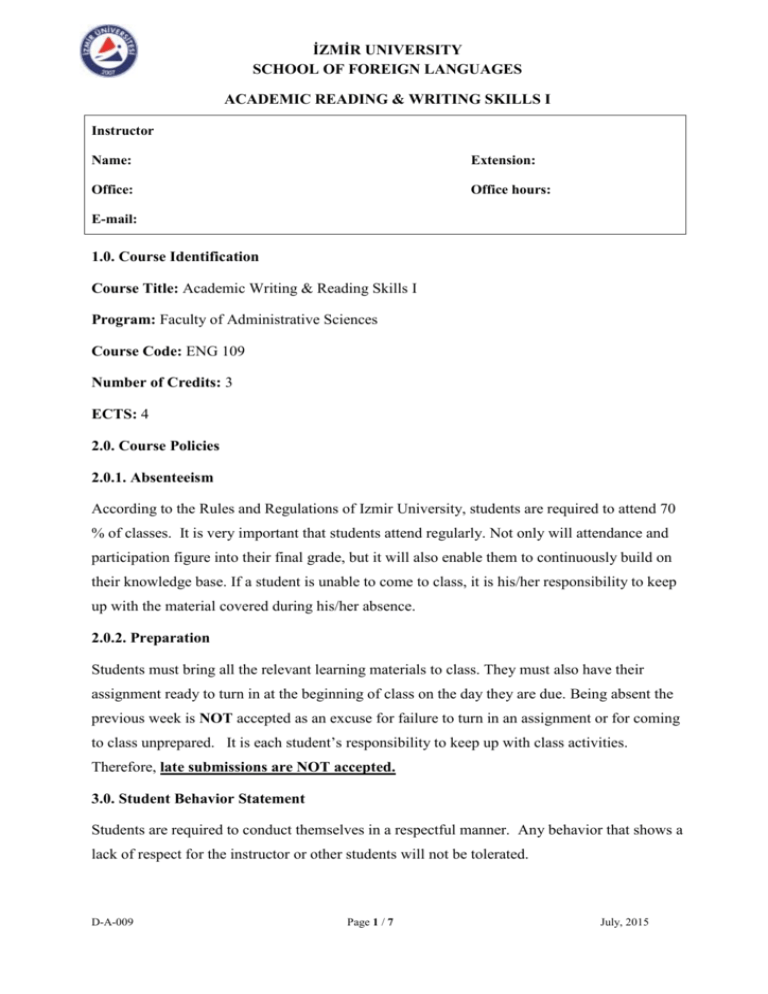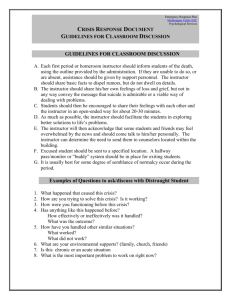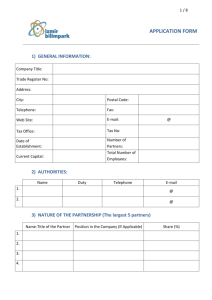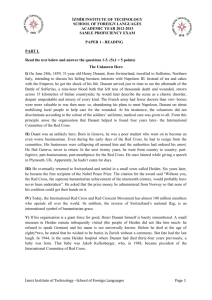school of foreign languages
advertisement

İZMİR UNIVERSITY SCHOOL OF FOREIGN LANGUAGES ACADEMIC READING & WRITING SKILLS I Instructor Name: Extension: Office: Office hours: E-mail: 1.0. Course Identification Course Title: Academic Writing & Reading Skills I Program: Faculty of Administrative Sciences Course Code: ENG 109 Number of Credits: 3 ECTS: 4 2.0. Course Policies 2.0.1. Absenteeism According to the Rules and Regulations of Izmir University, students are required to attend 70 % of classes. It is very important that students attend regularly. Not only will attendance and participation figure into their final grade, but it will also enable them to continuously build on their knowledge base. If a student is unable to come to class, it is his/her responsibility to keep up with the material covered during his/her absence. 2.0.2. Preparation Students must bring all the relevant learning materials to class. They must also have their assignment ready to turn in at the beginning of class on the day they are due. Being absent the previous week is NOT accepted as an excuse for failure to turn in an assignment or for coming to class unprepared. It is each student’s responsibility to keep up with class activities. Therefore, late submissions are NOT accepted. 3.0. Student Behavior Statement Students are required to conduct themselves in a respectful manner. Any behavior that shows a lack of respect for the instructor or other students will not be tolerated. D-A-009 Page 1 / 7 July, 2015 İZMİR UNIVERSITY SCHOOL OF FOREIGN LANGUAGES 4.0. Academic Honesty Statement Cheating on assignments and tests is a violation of University rules. Plagiarism, or other forms of academic dishonesty, is not accepted and tolerated. If plagiarism is found in your assignment, your instructor will follow the procedures on academic dishonesty. The sanctions for academic dishonesty and / or cheating on tests range from deduction / cancellation of marks to applying penalties imposed by the relevant articles in the Law on Higher Education. 5.0. Academic misconduct More specific but not exhaustive examples of acts and behaviors that fall beneath this category are as follows: Impairing the orderly conduct of a class and thus hindering the learning of others or interfering with execution of the lesson (e.g. disrupting class, improper questioning of instructor’s decisions concerning the execution of the lesson or evaluation of student performance) Impairing the orderly conduct of an examination and thus hindering the performance of others Attempting to give/receive or giving/receiving unauthorized help that lead to an unfair advantage on exams and any work or assignments submitted for assessment, i.e. cheating or collusion Plagiarism, i.e., the intentional use of ideas and words of another without proper acknowledgement, referencing or citation Refusing to follow the instructor’s directives and instructions Tampering with exam results or other official documents Failure to return borrowed books 5. 0. 1. Formal action If the behavior or act continues despite informal action, formal action is taken. The Vicedirector informs the Director within two (2) days following the recurrence of the behavior for the third time. The Director sets up a disciplinary committee comprising the Director and two other instructors within two (2) days following notification. The student in writing is called to a disciplinary interview where s/he is reminded once again of the code of conduct required and of the expected standard of action. The committee advises the student to abide by the rules, regulations, procedures and practices of the SFL. Should the act or behavior still persist or in cases of gross misconduct, the Director sends official notification to the Dean of the Faculty to which the student is enrolled and requests D-A-009 Page 2 / 7 July, 2015 İZMİR UNIVERSITY SCHOOL OF FOREIGN LANGUAGES disciplinary action as described in Article 54 of Law 2547 on Higher Education and The Law on Student Discipline in Higher Education to be taken. The Dean may initiate an investigation in accordance with the timescale indicated in the fore-mentioned documents to determine whether there has, in fact, been a breach of discipline and whether disciplinary action is warranted. If such action is found to be warranted, an appropriate sanction will be proposed by the Dean in accordance with The Law on Student Discipline in Higher Education and by the University Executive Board. 6.0. Assessment All assessment tools are prepared in accordance with the aims and objectives indicated in the syllabuses and aim to measure the extent to which these aims and objectives have been achieved. Thus, they aim to measure the students’ knowledge base and their performance in basic academic skills. 6.0.1. Exams There are two different exams during a term: Midterm and Final exam. Test specifications of the exams are published one week prior to the exam on the IZU SFL website (http://www.izmir.edu.tr/ydyo/ ). 6.0.2. Written assignment The aim of this assignment is to evaluate: students’ acquisition of academic writing skills, their ability to make use of and reflect on feedback, and the progress they demonstrate through drafting within the writing process. Students are expected to submit one such process-oriented assignment for evaluation each semester. The task is indicated in the instructional program and details as well as deadlines are published on the IZU SFL website (http://www.izmir.edu.tr/ydyo/ ) and announced in class. This assignment is evaluated by the relevant class instructor according to rubrics provided by the Administration. 6.0.3. Class performance grade The Class Performance Grade (CPG) is the average of the grades given by the class instructors on a 1-100 scale. This grade reflects the students’ performance in the classroom and activities D-A-009 Page 3 / 7 July, 2015 İZMİR UNIVERSITY SCHOOL OF FOREIGN LANGUAGES assigned to the students by the class instructor. Students’ performance on the classroom activities is followed up by the class instructor(s) in accordance with the rubric provided by the Administration and an overall class performance score is assigned. Students are graded based on their preparation for class, i.e. homework and materials, their performance in class, i.e. readiness to learn, attentiveness, participation in tasks and activities, as well as on their speaking skills. 6.0.4. Calculations and criteria for success Students’ final grade is calculated as follows: 10% of Class Performance Grade 20% of grade on written assignment 30% of the Midterm Exam score 40% of the Final Exam score Students with a total of 60 (59.50) pass the course. Students with a total score of 59.49 or below are required to repeat the same course until they pass. Letter grades are assigned as follows: AA: 90-100 BA: 85-89 BB: 80-84 CB: 75-79 CC: 70-74 DC: 65-69 DD: 60-64 FD: 50-59 FF: 0- 49 6.0.5. Objecting to an exam result Students may object to the grade they have received on a specific test within 5 (five) days following their of the test result. To do so, they must submit a petition to the Directorate requesting that their exam documents be reviewed. Should an error in grading be detected, the grade will be corrected with approval from the instructor and the School Executive Board. Students may not object to an instructor’s evaluation of their performance. D-A-009 Page 4 / 7 July, 2015 İZMİR UNIVERSITY SCHOOL OF FOREIGN LANGUAGES 7.0. Course Materials In this course, the following textbook will be used: Hewings, M. (2012). Cambridge Academic English: Upper intermediate level. Cambridge: Cambridge University Press. The course instructor will provide each student with a textbook at the beginning of the semester. 8.0. Course Description 8.0.1. Course Objectives READING Objectives: By the end of this course, students will have interacted effectively with different texts of different genres in order to draw appropriate meaning from texts by practicing the following comprehension strategies and reading skills: o distinguishing between discourse genres and various text types, o scanning by looking for key words, headings, dates, numbers etc., o skimming by reading quickly the first/last paragraphs and first/last sentences of paragraphs, o identifying the relationships between the ideas by sequencing them in an academic text/ essay/ article by focusing on details, the logical progression of ideas and the text organization, o inferring meaning by raising awareness of connotations, implied meaning as well as the writer’s choice of vocabulary, o recognizing reference words by raising awareness of backward and forward referencing and avoiding repetition by using that (of) and those (of), o identifying main points and supporting details in a reading text, o understanding APA references by focusing on footnotes, reference page and intext citation, o predicting and previewing to anticipate the content, language and purpose of a text by looking at titles, headings and visuals, D-A-009 Page 5 / 7 July, 2015 İZMİR UNIVERSITY SCHOOL OF FOREIGN LANGUAGES o understanding implicit meaning in an academic text/ essay/ article by focusing on the consequences and reasons, o guessing the context of an academic text by looking at the title, headings and words highlighted or underlined. LISTENING Objectives: By the end of this course, students will have practiced listening for the gist of a factual text by focusing on opening sentences, listing signals, and content words, recognizing word order patterns, taking precise and detailed notes, identifying and evaluating information presented to support a position, understanding relationship between ideas, listening for details and scanning for specific information of a factual text by focusing on key words and relevant vocabulary items, identifying the organization in a speech by understanding lecture aims and outlines in a lecture by focusing on the introduction of a lecture and the organization of a lecture. WRITING Objectives: By the end of this course, students will have written a well-organized paragraph with a definition of key term or terms, examples and explanations by paying attention to unity, coherence, cohesion and writing relevant main idea, supporting detail and concluding sentences by using line charts, graphs, figures and tables, gained confidence in written communication by practicing o composing a four-paragraph informative essay by differentiating describe, discuss and defend types (Cambridge Academic English, Upper Intermediate Book, page 20), o maintaining cohesion by using cohesive devices by practising linking parts of texts (Cambridge Academic English, Upper Intermediate Book, page 24) and using verb- D-A-009 Page 6 / 7 July, 2015 İZMİR UNIVERSITY SCHOOL OF FOREIGN LANGUAGES noun collocations (Cambridge Academic English, Upper Intermediate Book, page 25), o drafting/ outlining an essay by analysing describe, discuss and defend types of essay, o reporting information from a written or spoken source by using reporting verbs and paraphrasing, o writing up a list of references and synthesizing information from a variety of oral / written sources to support claims with evidence by using APA reference and in-text citation, o including quotations in an essay by using APA reference and in-text citation, o identifying and practising the structure, organization and lexico-grammar of an essay that aims to describe a problem and objectively evaluate the possible solutions, o using appropriate register by analyzing language use to gain insight into formal vs. informal lexis and structures and hedging. SPEAKING Objectives: By the end of this course, students will have gained confidence in expressing facts and opinions by asking and answering questions, developing a clear argument, expanding and supporting his/ her point of view about a lecture, using cautious, politically and socio-linguistically correct language and appropriate register by using hedging. D-A-009 Page 7 / 7 July, 2015








